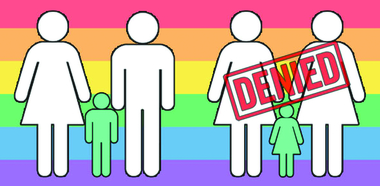Let’s get a few things straight about LGBT+ adoption

By Jordan Redman
Staff Writer
The last decade has seen a prominent rise in the number of LGBT+ people forming their own families through adoption, foster care, artificial insemination and other means.
The United States is facing a critical shortage of adoptive and foster parents. As a result, hundreds of thousands of children are without permanent homes.
Several states are contributing to that shortage by passing discriminatory legislation that limits who is eligible to become an adoptive or foster parent.
Measures like SB1140 in Oklahoma would allow state-funded religious-based adoption agencies to discriminate against same-sex couples, single people and non-Christians.
Representative Leslie Osborn introduced an amendment this morning, which passed. The amendment introduced was to deny state and federal funding to any agency that discriminates.
The bill is now on its way to the House floor.
Also, in Kansas, two identical bills, each named the Adoption Protection Act were heard in the House and Senate. These bills would prevent the state from forcing faith-based adoption agencies to place children into homes that violate their religious beliefs.
The following is a breakdown of myths vs. reality on LGBT+ adoption, according to the American Civil Liberties Union.
MYTH: Children need a mother and a father to have proper male and female role models.
REALITY: Children without homes have neither a mother nor a father as role models. They get their role models from many places besides their parents. These include grandparents, aunts and uncles, teachers, friends and neighbors. In a case-by-case evaluation, trained professionals can ensure that the child to be adopted or placed in foster care is moving into an environment with adequate role models of all types.
MYTH: Children raised by gay or lesbian parents are more likely to grow up gay themselves.
REALITY: All of the available evidence demonstrates that the sexual orientation of parents has no impact on the sexual orientation of their children and that children of lesbian and gay parents are no more likely than any other child to grow up to be gay. There is some evidence that children of gays and lesbians are more tolerant of diversity, but this is certainly not a disadvantage. Of course, some children of lesbians and gay men will grow up to be gay, as will some children of heterosexual parents. These children will have the added advantage of being raised by parents who are supportive and accepting in a world that can sometimes be hostile.
MYTH: Children raised by lesbians and gay men will be brought up in an “immoral” environment.
REALITY: There are all kinds of disagreements in this country about what is moral and what is immoral. Some people may think raising children without religion is immoral, yet atheists are allowed to adopt and be foster parents. Some people think drinking and gambling are immoral, but these things don’t disqualify someone from being evaluated as an adoptive or foster parent. If we eliminated all the people who could possibly be considered “immoral,” we would have almost no parents left to adopt and provide foster care. That can’t be the right solution. What we can probably all agree on is that it is immoral to leave children without homes when there are qualified parents waiting to raise them. And that is what many gays and lesbians can do.
MYTH: The only acceptable home for a child is one with a mother and father who are married to each other.
REALITY: Children without homes do not have the option of choosing between a married mother and father or some other type of parent(s). These children have neither a mother nor a father, married or unmarried. There simply are not enough married mothers and fathers who are interested in adoption and foster care. Last year only 20,000 of the 100,000 foster children in need of adoption were adopted, including children adopted by single people as well as married couples. Our adoption and foster care policies must deal with reality, or these children will never have stable and loving homes.
The Gayly. April 19, 2018. 9:47 a.m. CST.





